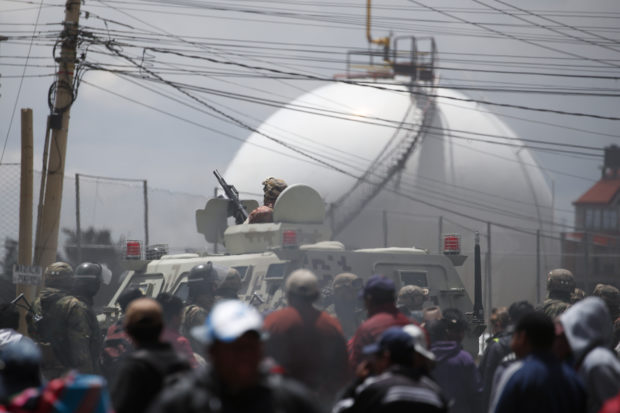
Soldiers guard the perimeters of the state-own Senkata filling plant, as supporters of former President Evo Morales gather round, in El Alto, on the outskirts of La Paz, Bolivia, Tuesday, Nov. 19, 2019. Morales’ backers have taken to the streets asking for his returns since he resigned on Nov. 10 under pressure from the military after weeks of protests against him over a disputed election he claims to have won. (AP Photo/Natacha Pisarenko)
El ALTO, Bolivia — Police and soldiers on Tuesday escorted gasoline tankers from a major Bolivian fuel plant that had been blockaded for five days by supporters of former President Evo Morales, and at least three people were reported killed while the operation was underway.
The public defender’s office and the ombudsman’s office also reported 30 people injured but said the circumstances of the deaths and injuries hadn’t been determined.
An Associated Press journalist in the area heard shooting near the fuel plant. Smoke rose from fires set by protesters and a military helicopter was seen flying over the area.
The military said in a statement that the operation to move the fuel from El Alto to the nearby capital of La Paz was peaceful. Defense Minister Fernando Lopez said later that troops did not use firearms in the operation.
Ombudsman Nadia Cruz said the deaths were caused by gunshots. She called for the interim government to withdraw troops from policing operations to reduce violence.
Some Bolivian cities have reported food and gasoline shortages because of demonstrations by pro-Morales groups.
Víctor Hugo Zamora, the hydrocarbons minister, told ATB television that 23 tanker trucks were able to load on fuel at the plant.
Morales resigned Nov. 10 following weeks of mass protesters over a disputed election in which his opponents believe he rigged the vote count. He left for asylum in Mexico.
Twenty-seven people have been killed in unrest since the October 20 election. An interim government says it wants to organize new elections, but it faces fierce opposition from Morales’ camp.
A U.N. envoy and church groups are trying to broker dialogue among Bolivia’s factions.
The Organization of American States said Tuesday that new elections should be held as soon as possible, with mechanisms that ensure the process is fair. Prior to Morales’ resignation, the OAS conducted an audit that found irregularities in the October 20 vote.
There have to be “basic guarantees so that a situation like the one that happened in the last elections don’t occur again,” OAS representative Rodolfo Piza said after meeting with Jeanine Áñez, Bolivia’s self-proclaimed interim president.